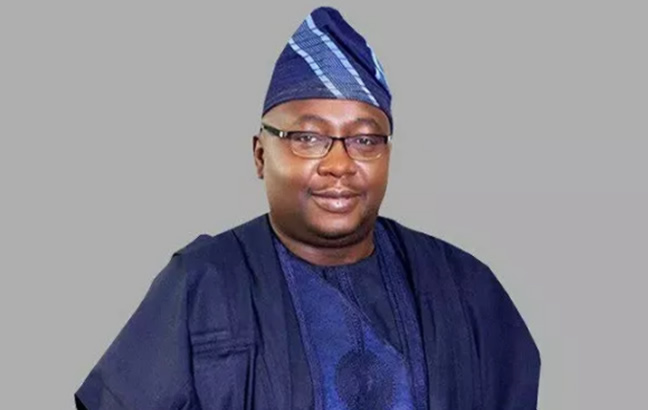Adelabu Calls for Improved Public-Private Sector Synergy to Address Critical Challenges in Power Sector
…urges energy correspondents on transparent reportage about the Nigerian power sector.
By Ndubuisi Micheal Obineme
Nigeria’s Minister of Power, Adebayo Adelabu, has stressed the need to create an improved partnership between the public and private sectors to address critical issues in the Nigerian power sector.
The minister who made the call at the 2023 annual strategic international conference of the Association of Energy Correspondents of Nigeria (NAEC), noted that the numerous challenges in the power sector have led to frequent power outages, fluctuations in electricity generation, and some cases complete grid collapse.
The minister who was represented at the NAEC Conference by Engr (Dr) Nosike E.N, The Director of, the Transmission Services Department, said that the government has set an ambitious target to generate about 30,000MW of electricity by 2030 with renewable energy contributing 30 percent to Nigeria’s energy mix.
However, he acknowledged that Nigeria’s current power sector infrastructure cannot effectively generate the much-needed electricity for the country.
He explained that the reason for this is that Nigeria currently has a low power generation, transmission, and distribution capacity of about 5,625MW, 8,500MW, and 8,425MVA respectively, which are inadequate to even reach the targeted power generation of 20,00OMW in the short-term.
Adelabu expressed serious concerns over these issues, noting that the power sector is faced with multiple challenges which also comprise insufficient generation capacity, tripping of transmission lines, vandalization of power infrastructure, high frequency due to low demand for power, and aging infrastructure.
Speaking specifically on the challenges and government interventions, the minister said that the insufficient power generation in Nigeria is due to outdated power plants, underinvestment in new generation infrastructure, and over-reliance on fossil fuels such as gas/steam and diesel.
“The interruption in electricity supply is a result of sudden outage in the transmission line which may be as a result of overloading, overheating of insulation, and faulty substation equipment.
“Vandalization of power infrastructure is a significant challenge in Nigeria’s Power Network. Criminal elements, sometimes intentionally damage power lines, transformers, and other equipment associated with low levels of surveillance and security on all electrical infrastructures.
“High frequency due to low demand for power is often referred to as “over-frequency” or “over generation” and it occurs when the power supply exceeds the demand on the grid. Its effect can be felt in the Overloading of Generators and Transformers, Loss of Synchronization, and Frequency Instability. When the frequency goes up, the machine output reduces, and vice versa.
“When power systems infrastructure has exceeded its expected lifespan, it needs repair, rehabilitation, or replacement. Aging power network infrastructure can lead to increased failure rates and reduced reliability without adequate maintenance and system upgrades.
“These issues have had far-reaching consequences on the nation’s development, and as such, may risk losing potential investors.”
To address these challenges, he said there is a need for the government and private sector to collaborate on developing a strategic approach to upgrade and modernize the electricity transmission infrastructure to fully realize the anticipated benefits of privatizing the power sector.
Speaking further, he said, “Nigeria needs about $262 billion in investment to meet the expansion needs of the power sector by 2030.”
On the government side in terms of providing an enabling environment to attract investment, he said the Federal Government approved the ‘Electricity Act 2023’ to attract the required private sector investment to bridge the huge deficits of electricity demand and supply.
The Electricity Act 2023, endorsed by President Bola Ahmed Tinubu, enables the States, companies, and individuals to generate, transmit, and distribute electricity.
He highlighted that going forward, “The Federal Government would no longer provide sovereign guarantee between investors and organizations. This procedure would enhance accountability and responsibility between both parties.
“Contract financing should be encouraged. The contract financing should be between the investor and the organization. For instance, if somebody wants to invest in the transmission of electricity today with the Transmission Company of Nigeria(TCN), it should be between the investor and the TCN. What we see in Nigeria is that the Federal Government provides a sovereign guarantee, assuring the investor that the money will not be lost, and that provides a situation where the investor and the organization relax because they know that the government will pay. For now, we have proposed a situation where the investor and the leader will be committed to ensuring that the project works and payments will be from the proceeds of that project.
“There should be a gas power policy. The policy on gas to power should be adequately streamlined.
“Concerted effort should be made at the relation of Nigerian currency to foreign currency,” he stated.
He added that Nigeria can overcome all these challenges if there is an improved public and private sector collaboration, while the government is working on providing an enabling environment for ease of doing business in the power sector.


